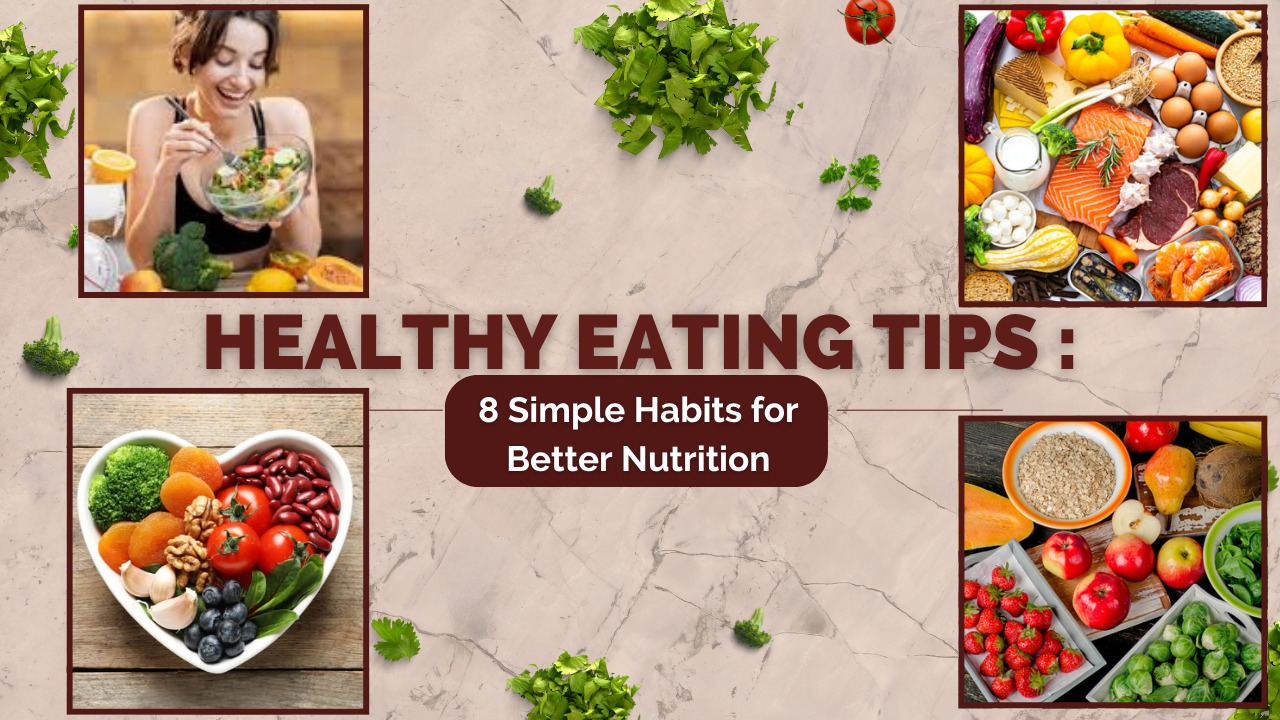Healthy eating is more than just a popular trend—it’s a lifestyle choice that supports your overall health. Making the right food choices helps improve physical strength, mental focus, and emotional balance. A diet rich in fruits, vegetables, whole grains, and lean proteins gives your body the fuel it needs to function at its best.
In today’s fast-paced world, it’s easy to rely on fast food and packaged snacks. However, these often contain high levels of sugar, salt, and unhealthy fats. One of the most important healthy eating tips is to plan your meals ahead of time and choose natural, whole foods whenever possible. Cooking at home can also help control ingredients and portion sizes.
Developing good eating habits takes time, but the long-term benefits are worth the effort. By following simple healthy eating tips, such as drinking plenty of water and limiting processed foods, you can support long-term wellness and prevent many common health issues. Small changes make a big difference.
Prioritize Whole, Unprocessed Foods

Whole foods are packed with important nutrients like vitamins, minerals, fiber, and antioxidants. These natural foods help your body stay strong, support your immune system, and keep your energy levels steady throughout the day. Eating more whole foods is one of the simplest healthy eating tips to follow.
In contrast, processed foods often contain added sugars, unhealthy fats, and artificial ingredients. These extras can lead to weight gain, digestive problems, and other health concerns. Relying too much on processed snacks or ready-made meals can reduce the quality of your diet over time.
Choosing whole foods like fruits, vegetables, nuts, seeds, and whole grains is a smart step toward better health. One of the most effective healthy eating tips is to shop the outer aisles of the grocery store, where fresh items are usually found. Simple changes like these can improve your daily nutrition.
Whole foods are foods that are as close to their natural state as possible.
These include:
Fruits and vegetables
Whole grains (like brown rice, quinoa, and oats)
Lean proteins (like fish, chicken, eggs, legumes)
Nuts and seeds
Unrefined oils (like olive or avocado oil)
How to Include
Start by filling half your plate with fruits and vegetables at every meal.
Replace refined grains like white bread with whole grains like brown rice or whole-wheat bread.
Swap sugary snacks for fresh fruit or a handful of nuts.
Stay Hydrated with Water, Not Sugary Drinks

Water is essential for almost every function in the body. It supports digestion, helps the body absorb nutrients, keeps body temperature balanced, and keeps joints working smoothly. Staying well-hydrated is one of the most important healthy eating tips for overall health.
Many people often confuse thirst with hunger and end up eating when their body actually needs water. This can lead to overeating and poor food choices, especially when they reach for sugary drinks instead of drinking water.
One of the easiest healthy eating tips is to drink water regularly throughout the day. Carrying a water bottle and sipping frequently can help prevent dehydration and keep you feeling full. Choosing water over sweetened drinks supports better digestion and helps maintain a healthy weight. Making water your go-to drink is a smart and simple way to improve your health every day.
Sugary Drinks and Their Impact
Soft drinks, energy drinks, sweetened teas, and even some fruit juices are loaded with sugar.
These drinks contribute to:
Weight gain
Increased risk of type 2 diabetes
Tooth decay
Energy crashes
Hydration Tips
Aim for 8–10 glasses of water a day, adjusting for activity level and climate.
Infuse water with lemon, cucumber, or mint for flavor.
Carry a reusable water bottle to encourage regular sipping.
Replace soda with sparkling water or herbal teas.
Control Portion Sizes and Practice Mindful Eating
Why Portion Control Matters
In today’s environment of oversized servings and fast-paced meals, managing portion sizes is more important than ever. Consuming large amounts of food—even nutritious options—can contribute to unnecessary calorie intake, weight gain, and discomfort after meals. One of the most effective healthy eating tips is to become aware of how much you’re eating and to serve smaller portions to support better digestion and maintain a healthy body weight.
What is Mindful Eating ?
Mindful eating involves paying full attention to the experience of eating. It means being mentally present at mealtimes, savoring each bite, and chewing food thoroughly. This practice encourages individuals to tune in to their body’s natural hunger and fullness cues, helping to prevent overeating. Among the most valuable healthy eating tips, mindful eating promotes a deeper connection with food, reduces impulsive snacking, and enhances satisfaction with smaller, more nourishing meals.
Tips for Portion Control and Mindful Eating
Use smaller plates and bowls to visually trick your brain into feeling satisfied.
Eat slowly and without distractions (like your phone or TV).
Stop eating when you’re 80% full, giving your body time to signal satiety.
Avoid second servings unless you’re truly hungry.
Balance Macronutrients in Every Meal

Understanding macronutrients is a key part of building a balanced diet. Macronutrients include carbohydrates, proteins, and fats—each playing a different role in keeping the body healthy and energized. Carbohydrates provide energy, proteins support muscle repair, and fats help with brain function and hormone balance.
Balancing these nutrients is one of the most important healthy eating tips. Eating too much of one and not enough of another can affect energy levels, mood, and overall health. For example, skipping healthy fats can make you feel tired, while eating too many refined carbs can cause sugar spikes and crashes.
To apply these healthy eating tips, include a mix of whole grains, lean proteins, and healthy fats in your meals. Choose natural food sources and avoid overly processed items. Understanding macronutrients helps you make smarter food choices that support long-term wellness and daily energy.
The Key is Balance
Rather than cutting out a macronutrient (like carbs or fats), focus on balance:
Combine complex carbs (like sweet potatoes or brown rice) with lean proteins (like chicken or tofu) and healthy fats (like avocado or nuts).
This balance helps regulate blood sugar, keeps you full longer, and supports metabolism.
Example of a Balanced Meal
Grilled salmon (protein + healthy fat)
Quinoa (complex carb)
Steamed broccoli and carrots (fiber and nutrients)
Olive oil and lemon dressing
Limit Added Sugars and Refined Carbs
What Are Added Sugars ?
Added sugars are sweeteners that are included during the processing of foods. You can find them in many common products like candies, soft drinks, baked items, sauces, and breakfast cereals. These sugars do not provide any essential nutrients and only add extra calories to your diet.
One of the most important healthy eating tips is to check food labels for hidden sugars. Eating too much added sugar can lead to weight gain, tooth problems, and increased risk of diabetes. Choosing foods with little or no added sugar, like fresh fruits or plain yogurt, can help you maintain better health. Reducing added sugar intake is a simple step that makes a big difference in overall wellness.

Health Risks of Excess Sugar
Increases the risk of obesity
Contributes to type 2 diabetes
Causes mood swings and energy crashes
Promotes inflammation and aging
How to Reduce Sugar Intake
Read food labels and look for ingredients ending in “-ose” (like fructose or glucose).
Replace sugary snacks with fruit, yogurt, or dark chocolate (70%+ cocoa).
Use natural sweeteners like honey or maple syrup in moderation.
Avoid sugary drinks; opt for unsweetened beverages.
Eat More Fiber-Rich Foods
Fiber is an important part of a healthy diet. It helps with digestion by keeping bowel movements regular and preventing constipation. Fiber also plays a role in balancing blood sugar levels and lowering cholesterol, which supports heart health and overall well-being.
One of the most useful healthy eating tips is to eat more fiber-rich foods like fruits, vegetables, whole grains, beans, and nuts. These foods also help you feel full for longer, which can support weight control. In addition, fiber feeds the healthy bacteria in your gut, helping maintain a strong digestive system. Making fiber a regular part of your meals is a simple way to improve your long-term health.

There are two types:
Soluble fiber (found in oats, beans, fruits)
Insoluble fiber (found in whole grains, vegetables, nuts)
How Much Do You Need ?
Women: ~25 grams/day
Men: ~38 grams/day
Easy Ways to Increase Fiber
Start your day with a high-fiber breakfast (like oatmeal with berries).
Add beans or lentils to salads and soups.
Snack on carrot sticks, apples, or almonds.
Choose whole grain versions of bread, pasta, and rice.
Plan and Prepare Your Meals Ahead
Why Planning Matters
When you’re hungry and unprepared, it’s easy to reach for fast food or processed snacks. Meal planning:
Saves time and money
Reduces stress and impulsive eating
Helps maintain portion control and balanced nutrition
Steps to Successful Meal Planning
Create a weekly menu with a balance of proteins, carbs, and fats.
Grocery shop with a list to avoid unhealthy temptations.
Batch cook staples like rice, grilled chicken, and roasted veggies.
Store meals in portion-sized containers for easy grab-and-go.
Sample Meal Prep Day
Breakfast: Overnight oats with chia seeds and blueberries
Lunch: Grilled chicken quinoa bowl with veggies
Snack: Hummus and sliced cucumbers
Dinner: Stir-fried tofu with brown rice and broccoli
Listen to Your Body and Cultivate a Healthy Relationship with Food
Food Should Nourish, Not Punish
Many people fall into cycles of guilt, binge eating, or restrictive dieting. A healthy relationship with food means:
Eating intuitively: Honor hunger and fullness.
Avoiding labels like “good” or “bad” food.
Being flexible: Occasional indulgences are okay.
Respecting your body’s needs over diet trends.
Signs of a Healthy Relationship with Food
You enjoy all foods in moderation without guilt.
You don’t obsess over calories or macros.
You prioritize how food makes you feel — energized, nourished, and satisfied.
Conclusion

In conclusion, embracing these healthy eating tips can lead to transformative changes in your overall well-being. By choosing whole foods, staying hydrated, practicing mindful eating, and maintaining a balanced intake of nutrients, you support not just physical health but mental clarity and emotional balance as well. Reducing added sugars, increasing fiber, planning meals, and developing a positive relationship with food further solidify a sustainable, nourishing lifestyle.
Healthy eating is not about restriction or perfection; it’s about making smarter, more mindful choices that align with your body’s needs. With time and consistency, these habits become second nature, empowering you to live a more energetic, disease-resistant, and fulfilling life. Whether you’re just starting or looking to refine your routine, these healthy eating tips offer a solid foundation for long-term wellness. Remember, small changes add up—and every healthy choice is a step toward a better you.
FAQs
- What are the basic principles of healthy eating ?
The basic principles of healthy eating include consuming a variety of whole, unprocessed foods, balancing macronutrients, staying hydrated, and avoiding excess sugar and refined carbs. Following these healthy eating tips can help improve energy levels and prevent chronic diseases. - How can I start eating healthy on a budget ?
Start by buying seasonal produce, cooking at home, and planning meals in advance. Many healthy eating tips recommend whole grains, beans, and frozen vegetables, which are both affordable and nutritious. - Are cheat meals okay when following healthy eating tips ?
Yes, occasional indulgences are perfectly fine. Most healthy eating tips encourage balance and flexibility rather than strict dieting, which helps create a sustainable and enjoyable lifestyle. - How do I avoid cravings for unhealthy snacks ?
Cravings often come from nutrient deficiencies or emotional triggers. One of the best healthy eating tips is to stay full with fiber-rich foods and healthy fats, which reduce the urge to snack on junk food. - Can healthy eating improve mental health ?
Absolutely. Many healthy eating tips highlight the link between nutrition and brain function. A balanced diet rich in vitamins, minerals, and omega-3s can help boost mood, reduce anxiety, and support overall mental well-being.


